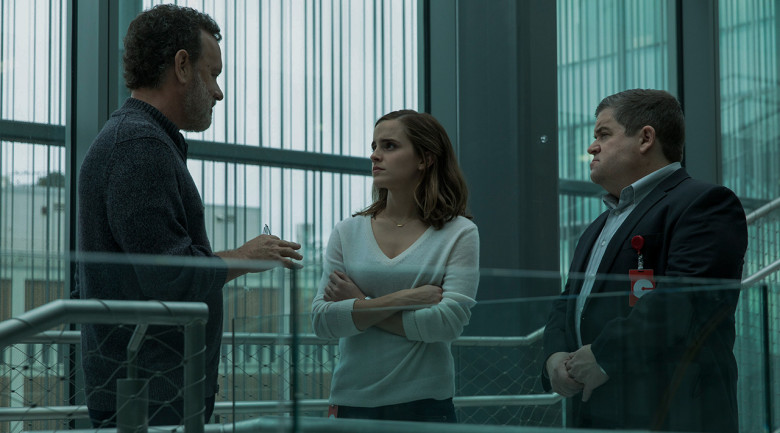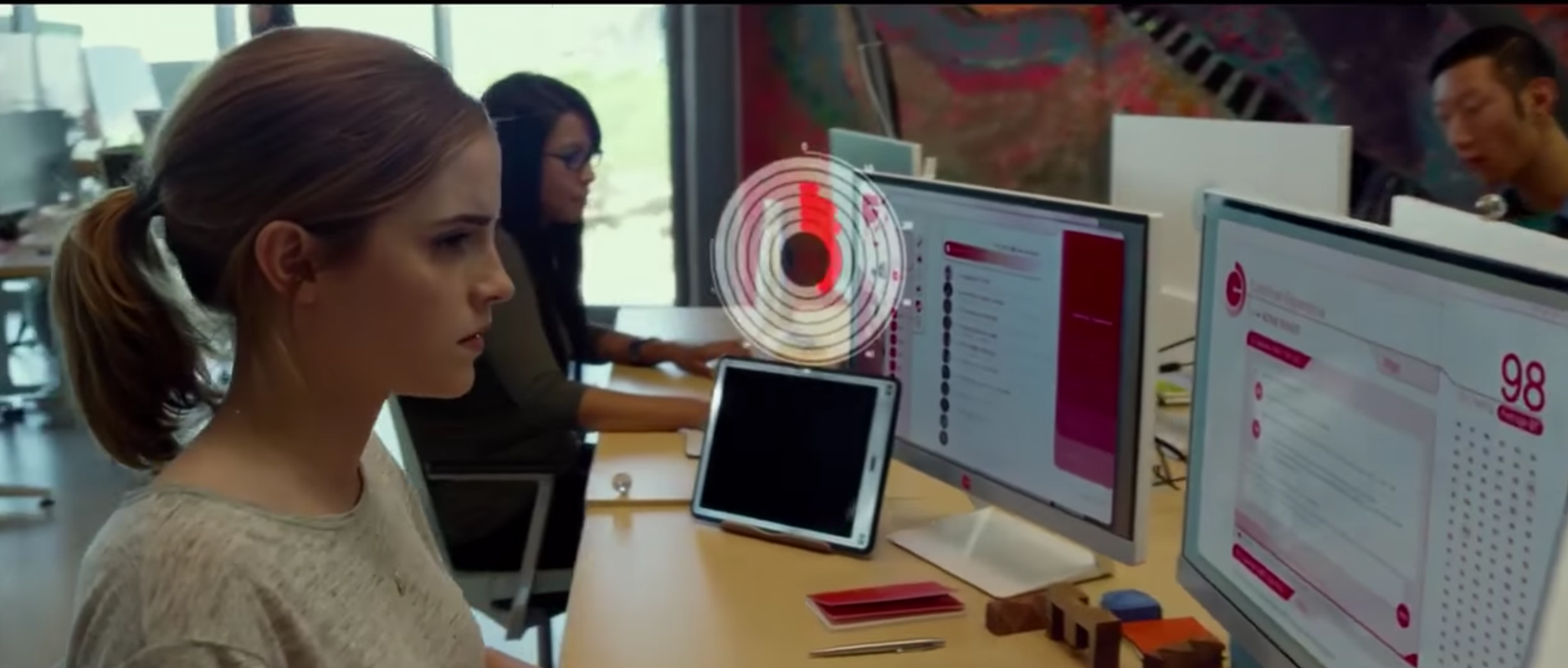
Tom Hanks, Emma Watson, and Patton Oswalt star in “The Circle” — based on the novel by Dave Eggers and directed by James Ponsoldt. (Image courtesy of Playtone)
Moviegoers and TV watchers can be a fickle bunch. While we haven’t quite reached the point of diminishing returns on dystopian stories, our reaction to cautionary tales about the Internet seem more reserved. That’s probably because it’s easier to jump into an end-of-the-world-as- we-know-it narrative simply due to the fact that we know at the end of the movie or TV show, we can safely return to our usual lives. When a story cuts a little too close to home, it can be more than uncomfortable — especially when the subject is something that’s near and dear to us.
But let’s face it: despite how invasive the Internet is (and especially social media), we love it. We love that we’re at the center of a carefully curated universe; a universe where our Greek chorus of friends comment, like, share, and generally give a damn about what we do. When we don’t get that rush of dopamine from a post that fails to generate any reactions, it’s time to do something that will get attention. We’ve all done it, so I’m not casting aspersions on anyone, just pointing out that even though this massive surveillance system called The Internet (with all its nodes of access) is watching our every move and collecting that data on servers, we simply don’t care all that much. We’ve made our bargain with the beast because we’re human — and humans crave attention and community.
Craving attention and feeling the constraints of community figure prominently in ”The Circle” — a story written by novelist Dave Eggers that captures the zeitgeist of what the Internet has become. Though published in 2013, Eggers saw trends in the rise of Big Tech and humanity’s growing love affair with social media enough to craft a cautionary tale of how Big Tech and Big Government can potentially merge into a totalitarian society by knowing everything about everyone — and using that data to control individuals and groups who could potentially threaten their power. And while the film and novel share some similarities, the ending of each tale is different.
Starring Emma Watson, ”The Circle” centers on Mae — who would like a little upward mobility in her life. Stuck with a rather boring job in a bill collection department, she’s fairly broke, drives a crappy car, and lives with her folks. You know, kind of the stereotypical millennial college grad who has few prospects and a lot of debt. Thrown a lifeline by her friend Annie, she lands an interview with The Circle, a tech company that’s a combination of Google, Facebook, and Apple. This is a company that’s so rich, so thoroughly integrated into the lives of everyday folks, that it has the ability to use that trove of data to manipulate people on what to think and how to act.

Emma Watson as Mae Holland putting in some serious screen time in “The Circle” (Image courtesy of Playtone)
Mae starts out in Customer Experience (CU) doing a similar job she was doing at the beginning of the story —except instead of spending her days on the phone, she typing away at lighting speed on a two-screen computer terminal answering questions from The Circle’s customers. And because The Circle has at the center of its work culture a survey system that displays your customer satisfaction score for all to see, it not-so-subtly reinforces the importance of getting high ratings. At the beginning of her job, Mae’s score hovers in the low to mid 80 percent range. She knows that she needs to be in the high 90s, and is shown working hard trying to get her score to get into that coveted top tier. What gets one there? A Stepford Wives-like devotion to customer service that’s about making everyone feel good about their experience. Bending over backwards, always being supportive, and genuflecting on the alter of ”Is there anything else I can help you with?” are ways to improve one’s score.
Mae buys into the challenge (slowly at first, and then with real Á©lan later). But what really moves her from ”Guppy” to the converted at The Circle are the weekly all-employee innovation meetings — headed by a co-founder of the company, Eamon (Tom Hanks). Hanks plays Eamon as a warm version of Steve Jobs. He tells personal stories about his passion for surfing and how his obsession with surf conditions led to the creation of a wireless, self-powered, always on, satellite connected, gum ball size HD camera called ”See Change.” Placing that small camera at his favorite beach means he can check surf conditions whenever he wants — and no one knows the camera is there. But the application of the See Change camera can do more than just check surf conditions. Eamon points out that these cameras can essentially hold the powerful accountable in regimes where our wonderful freedoms don’t exist. It’s that stark contrast of good and evil Eamon paints that makes Mae think that The Circle really can change the world through technology that, yes, while invasive, can do more good than harm.
As the British may say, ”Ha. Bloody ha.”
The rest of the story center on Mae’s rise in the company from Guppy to inner circle innovator who uses the See Change camera to eventually catch criminals, and envisions The Circle’s social networking site as a platform to not only register voters, but require voters to vote. Because Mae thinks The Circle is not really a nefarious organization (or so she seems to believe most of the time), these innovations will revolutionize government by making every policy, every action…well, everything government does a reflection of the will of the people. In other words, true democracy. Of course such naive thinking is a by-product of being in a cult. And The Circle is very much a cult. Yes, the employees in the film joke about it, but at bottom they believe that the company and the fearless leaders who guide it can do no wrong.
Let me pause for a moment and write something I wrote earlier: ”Ha. Bloody ha.”
Will Mae be able to see The Circle’s plans for world domination? Or does she go to the proverbial dark side and buy into the kind of avuncular totalitarianism The Circle is peddling? Well, you’ll have to see the movie to find out, but suffice to say that while ”The Circle” does a serviceable job of weaving a cautionary tale, it falls shorts in some crucial ways. Most notably, Mae’s improbably rise from customer service to innovative leader. Eggers created an updated ”from the mailroom to the boardroom” narrative, but never does the filmmaker show us how Mae gets her ideas, other than her belief that ”Secrets are lies” — which is something she said to Eamon after he gently confronted her about coming into his office without his permission. Other holes in the story center on her friend Annie, whose work is burning her out. We don’t know what she does, or why she starts to lose herself, but her psychological disintegration is presented as important to the story. The biggest hole, though, has to do with The Circle’s plans regarding the takeover of governments. Why do they want to do this? What do they hope to gain? Nothing much is revealed, but we are meant to care about something so evil that it can’t even be explained.
Still, for all its inconsistencies, ”The Circle” earns a C for being satisfactory. It never rises to its potential, but doesn’t entirely sink in a sea of its own absurdity either. Rather, in a somewhat balanced way, ”The Circle” does warn us about the power of Big Tech in an age where data can be used for nefarious deeds and power grabs.





Comments